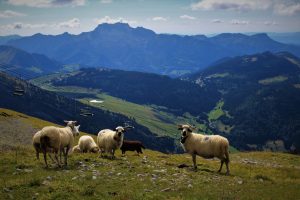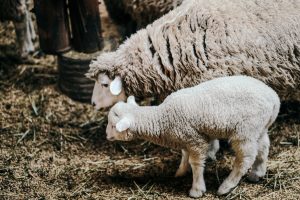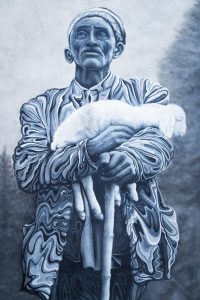Psalm 23 in the time of Covid-19
![]()
A few weeks ago in Zoom church, Cincinnati Mennonite Fellowship prayed the Lord’s Prayer, Psalm 23. Since it is part of a lectionary tradition, a great number of churches re-examined this psalm, as well.

Photo by Jared van der Molen on Unsplash
In our small church, we ask different congregants to give the Sunday welcoming statement each week. Using Psalm 23, Nate Washatka provided a welcoming statement that I find myself reading over and over.
Nate writes:
“Psalm 23 is the big one, one of those passages that is so familiar it’s almost difficult to see. But it’s also one of those passages that needs to be seen, especially now. It’s a poem for the ages. It has served as a source of comfort and reassurance for millennia. People have turned to it in every manner of calamity, in times of war, of plague, of illness, of hurricanes and earthquakes, of financial ruin, and so much more.
The Lord is our shepherd. We will fear no evil.
We are surrounded on all sides by peddlers of comfort. Silicon Valley comforts us with information and convenience. The media comforts us by confirming what we already think. Health experts comfort us with regimens of medications. Legions of merchants seek to comfort us with new cars, bigger homes, fancier gadgets and the status these confer. We are told to take comfort in our careers and educations, in our good looks, in whatever makes us unique.
The Lord is our shepherd. He restores our souls.
We find ourselves in a time when there are no clear answers. For all our medical and technological achievements, for all our economic sophistication, for all our insights into human psychology, we’ve been brought to our knees. No one knows when this will end, or how it will end, or how things will be different on the other side. Our comfort is incomplete. The cultural waters are far from still.
But take heart. The Lord is our shepherd. Our cup overflows. Even in these difficult days, even in the darkest valleys, he is with us.”
Thank you, Nate.

Photo by insung yoon on Unsplash
Randy Miller, our transitional minister, uses the male and female pronouns for God interchangeably, which fits with our church’s preference for welcoming individual perspectives of the Creator. In considering our church, I often imagine the early Anabaptists holding forth on certain scripture passages with each person’s faithful or intellectual perspective honored—and argued about, of course.
You can listen to Randy’s sermon on the CMF website. ‘A Table Before Me’, May 3
Using the fifty-year-old book, A Shepherd Looks at Psalm 23 by W. Phillip Keller, Randy examined the psalm verse by verse. Here are my notes on his sermon and my apologies for my misinterpretations and omissions. I’ve alternated shepherd and shepherdess in my notes. Randy used ‘shepherdess’ throughout.
The Lord is my shepherd, I shall not want –
The sheep are aware that the shepherd is looking after them, and they are not alone. With God we can be completely content.
She makes me lie down in green pastures –
With a faithful shepherdess, the sheep receive four things they must have: freedom from hunger, freedom from fear, freedom from friction with other sheep in the ‘butting’ order, and freedom from pests, usually aggressive flies.
He leads me beside the still waters –
Sheep are 70% water. The shepherd finds them fresh, clear water from wells, streams and springs, as well as from the fresh morning dew.
She restores my soul –
This is particularly important when a sheep founders. Randy tells of his own background of having to pluck the wool from sheep that had foundered and died. If a sheep lies down or tips over, it can land with its feet in the air and can’t get up. Without the help of the shepherdess, the sheep will die. The shepherdess faithfully keeps watch.

Photo by Paweł Czerwiński on Unsplash
He leads me in the paths of righteousness for his name’s sake –
Sheep are stubborn about moving, even after they have completely ruined a pasture by grazing. They must be led.
God, the shepherd, is responsible and takes this work seriously.
Even though I walk through the valley of death, I will fear no evil for God is with me –
The valleys lead upward to the best grazing lands on the higher plains, but the valleys are dangerous. There are predators and storms. The shepherd leads the sheep to safety.
Thy rod and Thy staff, they comfort me –
The Rod of a shepherdess is used against an intruder, and the Staff is used to bring a lamb back to its mother or to gently guide the sheep forward.
You prepare a table before me in the presence of my enemies –
A Table can mean a Plateau or Mesa, where the grass is plentiful. Even in the Table area, though, the grass can be surrounded by noxious weeds. The shepherd does not rest but continues to protect the sheep.
You anoint my head with oil –
Terrible flies get into the sheep’s nasal passages and lay eggs. When hatched, the flies make the sheep miserable. Shepherdesses apply oil to the infected places to give the sheep relief. In addition, oil is poured on the rams’ heads so that their butting glances off, reducing the damage they do to each other.
My cup overflows –
The cup can be one of Grace, but also one of Suffering. How very real it is to me that both are needed. One exists so that the other can be understood.
Surely goodness and mercy shall follow me all the days of my life –
‘Follow’ can also mean ‘pursue’. Imagine being pursued by goodness and mercy!
Also, consider what the sheep leave behind them as they move forward. Yes, that. Imagine it as goodness and mercy instead. What do we leave in our wake?
And I shall dwell in the house of the Lord forever –
The Psalmist may have meant ‘for all my life long.’ The Church has taken this phrase to mean ‘beyond my life, and in God’s presence.’
Randy ended his sermon by telling us the story of the three monks. They went as a group to meet a famous holy man. Two of the monks talked and talked with the holy man, but one monk remained silent. The holy man asked the silent man why he didn’t talk. The man said simply, ‘Father, it is enough to be with you.’
The Lord is my shepherd, I shall not want.
Thank you, Randy.

Photo by Jaka Škrlep on Unsplash
Another congregant, Judy Vander Henst, has been leading a Zoom Bible study, in which we’ve practiced listening for God’s voice. Last week, she held up cards with verses on them and asked us which color of card we liked best. I picked orange and received from Judy a clear example of God’s voice. Here are the words on the random card that arrived in the mailbox yesterday:
‘The Lord will shepherd us, seeking us out when we stray, pulling us back when we want to rush ahead, soothing our hearts and souls with a voice that is as familiar as our own breath—if we would just take the time to stop moving and doing and achieving and just listen for the One who has the answers to all the questions we’re asking.” Mary DeTurris Poust
Thank you, Judy.
__________________________________
I hope you are enjoying your own Zoom or video services. Someday we will meet together. Most of us can agree that we miss the in-person singing.
__________________________________
I welcome your comments: gretaholtwriter.com/blog.
{Thank you to my niece, Addie (Liechty) Kogan, for taking the picture that is this blog’s featured image. Her blog is: https://addieswriting.wordpress.com.}
Best wishes and have a good week.
Greta